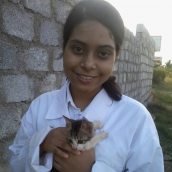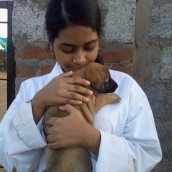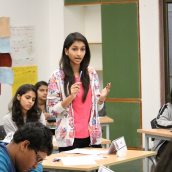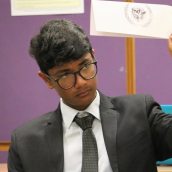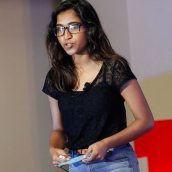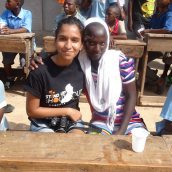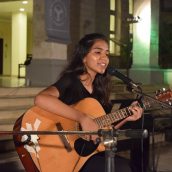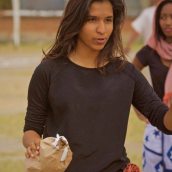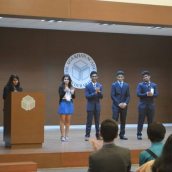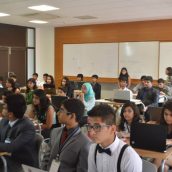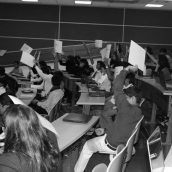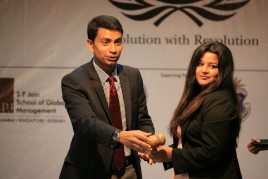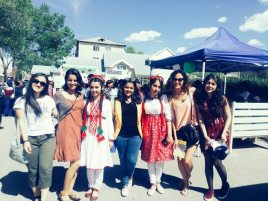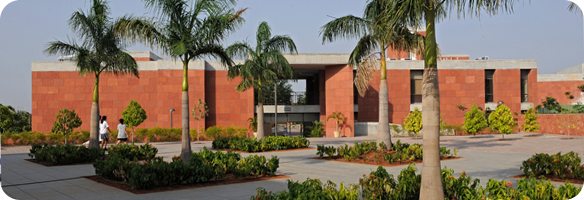
Our Campus
Built on a 100-acre site near the Rajiv Gandhi International Airport, the Aga Khan Academy Hyderabad offers state-of-the art facilities on a secure, landscaped campus.
Our school is the second in a network of Aga Khan Academies offering the highest international standard of education to students in countries across East Africa and South Asia.
The campus has been specially designed by renowned architects and is purpose-built. Our facilities include the following academic and resource areas:
- subject and age-specific classrooms
- well-equipped science and computer laboratories
- library and resource centres
- rooms for the fine arts, music and dance, including individual practice booths and a music recording area.
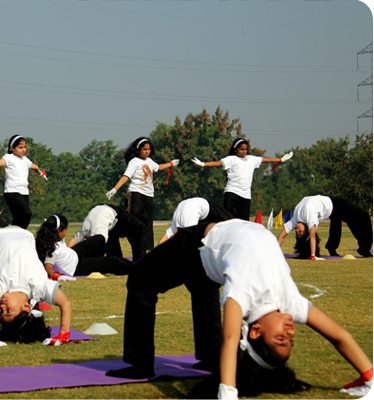 The Commons building houses the dining hall and an array of spaces for school activities. It is designed to be the hub of student activity, serving as the Academy’s main space for major school functions, including music and drama performances, and public lectures.
The Commons building houses the dining hall and an array of spaces for school activities. It is designed to be the hub of student activity, serving as the Academy’s main space for major school functions, including music and drama performances, and public lectures.
Sports facilities
Our sports facilities are extensive and include:
- swimming and diving pools
- sports fields, for example, for soccer, hockey and athletics
- cricket pitch
- tennis and squash courts
- athletics centre for aerobics, dance and fitness.
We invite you to visit the Academy to take a tour of our campus.
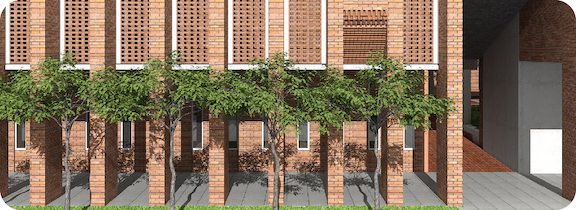
Living on Campus
Residential life at the Academy complements and extends the academic experience. Our residential programme includes a broad selection of activities and leadership opportunities to enhance students’ learning and growth. The Academy in Dhaka will offer a residential programme soon.
The Academy’s residences will include facilities to accommodate both students and teachers. Our residences will house boarding students requiring accommodation as well as those participating in international exchanges between the Aga Khan Academy Dhaka and other Academies and schools.
Teachers' quarters on campus will house both resident and visiting faculty.
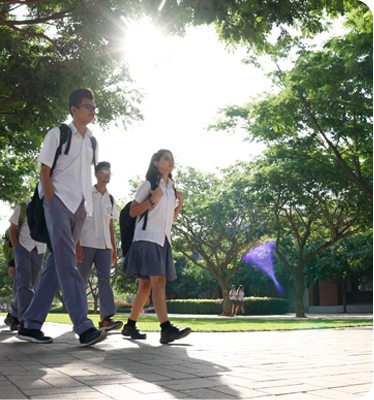 Learning beyond the classroom
Learning beyond the classroom
Our residential programme is about the learning and growth that comes through constant interaction with a diverse and talented group of teachers and peers.
Mealtimes and other gatherings will provide our residential students with opportunities for informal interaction as well as for discussions, meetings, language tables and study groups.
The focus of the residential experience is on students’ intellectual, social, spiritual and physical growth in a structured and ethical environment. Many of the least tangible but most important elements of an education – the development of practical leadership skills, the capacity to make ethical judgments, the ability to navigate through complex cultural settings – are formed outside the classroom.
The safe and secure environment of the Academy’s boarding facilities will give students of all backgrounds the opportunity to thrive emotionally, intellectually and physically.
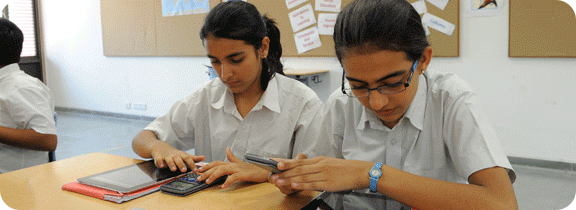
Admission Requirements
Choosing a school is an important decision in a child's and parent's life. We are here to help and answer any questions you might have.
We welcome enquiries about applying to the Academy. Our programmes are based on the principles and practices of the International Baccalaureate for primary and secondary-level students. The admission requirements for all the Academy's programmes, including language requirements, are outlined below.
Admission is competitive and based on student merit, regardless of a family’s ability to pay. The Academy endeavours to meet the demonstrated financial need of each admitted student.
Junior School
Grades 1–5: Primary Years Programme (PYP)
Students entering grade 1 ideally will have completed at least three years of nursery school and must be 6 years of age by 1 September of the year of entry.
Students may enter the first two years of the PYP without a strong prior knowledge of one of the languages of instruction, English or Hindi. However, in the last three years of the PYP, students must have a basic level of proficiency in both languages before they may be admitted.
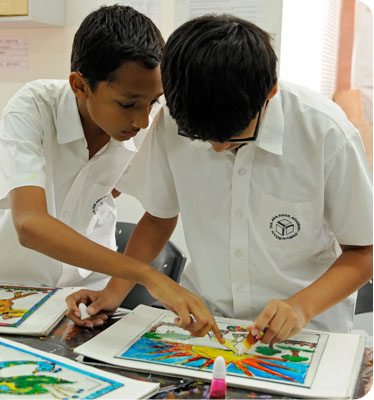 Senior School
Senior School
Students applying to the Senior School must have attained high scholastic achievement in their former educational institutions. They should also demonstrate a keen interest and participation in extracurricular activities such as sports, clubs, arts and music, and/or participation in community service projects outside the classroom.
Grades 6–10: Middle Years Programme (MYP)
Students without an intermediate level of proficiency in English may be admitted to the Middle Years Programme on a case-by-case basis. MYP students have the opportunity to study language A (language and literature) in both the official language (English) and national language (Hindi).
Grades 11–12: Diploma Programme (DP)
Applicants for the Diploma Programme must have demonstrated outstanding academic achievement as well as a record of active involvement in extracurricular and community service activities.
New students will not be accepted in the year of the Diploma exam.
Applying to the Academy
For further information about admissions, please contact the admissions office. Application and financial aid forms can be downloaded from the Application Forms page. Copies are also available from the admissions office.
*Please note that a completed financial aid form must be submitted together with the application form in order to apply for a bursary.
Tours of the Academy are held reguarly through the school year by appointment.
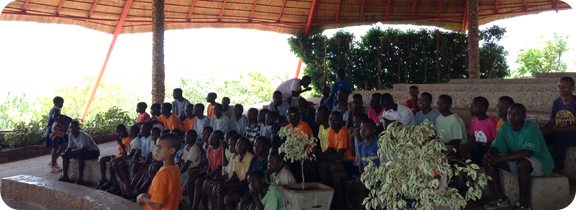
Community Service
Community service is an overarching and major facet of student education and experience at the Academies. Incorporated into student life and the curriculum, community service extends the educational experience beyond the classroom, informing students of the real-world implications of their studies. Through community projects with local organisations and groups, students gain a sense of the interconnectedness of their education with the world around them.
Students can participate in a variety of structured community initiatives and internships to learn about their place in the world.
By partnering with local Aga Khan Development Network agencies, students learn first-hand about the operations of an organisation and work towards making tangible contributions to the agencies.
In addition, community engagement provides an understanding of broad concepts such as human rights, dignity and autonomy, while emphasising the ethos of leaving the world a better place.
Examples of service projects from the Aga Khan Academy Mombasa:
Coast Rural Support Programme: Tree planting at Mtaa community reservoir. The reservoir was created as a community project. The outreach project involved planting 700 indigenous seedlings around the reservoir.
East African Quality in Early Learning: Creation of the Fun Reading Day initiative to promote early grade reading. Inspired by the common 1:10 ratio of students to books in local public primary schools, the first project was to collect books to establish a library at Ng’ombeni Primary School. Through a book drive and other community projects, students collected books and catalogued and prepared them for library use.
Our Junior School and Diploma Programme (DP) students visited the Ng’ombeni Primary School for group reading sessions. This project was then handed over to upcoming DP students to continue.
Education for Marginalised Children in Kenya (EMACK): Student’s council training workshop at Longo Primary School. Sarrah Sheikh came to know the Longo Primary School through her summer placement service. She went on to assist EMACK in establishing student leadership bodies, beginning with Longo Primary School. Topics covered went from effective leadership to communication tools, and the difference between prefects and elected student leaders. Three weeks after this project, the Kenyan government announced the phasing out of the prefect system and the introduction of elected student councils.
Madrasa Resource Centre: School painting project at Mpirani Nursery School. After visiting a school in disrepair, the DP students decided that a bright place was needed for the students to learn. They mobilised their fellow students to create bright learning materials and to repaint the school.
Indira Bulhan: Discovering Universal Success
“Physics has been the subject which never failed to fascinate me. It always made me question, understand, explore and enjoy at the same time. However, I am more interested in looking for things which are yet hidden from human intellect. I like doing things which no one has done before. I aspire to become an astronaut someday.”
It is Indira’s belief that her time at the Aga Khan Academy, Hyderabad will play a key role in allowing her to achieve her dreams and further her ambition to explore the mysteries of the universe.
“At the Academy, a school day is not just a normal school day, but an incredible journey. Every day is like a new exploration filled with fun and thrills. I enjoy the entire school day as it is filled with fun, challenges and of course, loving friends and supportive teachers.”Life at the Academy, however, is not simply about gaining a classroom education. For students like Indira, the Academy places great emphasis on learning life lessons through the community service programs that are part of their extracurricular activities. By teaching students the importance of caring about others, the Academy instills a sense of altruism and accountability that will hopefully grow as the students move forward with their lives.
“My favourite extracurricular activity is Caring Hands. [As a group], students go to an organisation where abandoned, ill and stray animals such as dogs, cats, rabbits and birds are kept and taken care of. Being an animal lover, I love going to the place where I can care for the animals and make them happy, even for a little while. Sometimes, language is not required to understand each other and to build a bond and this becomes evident when we go to Caring Hands.”
With her incredible appetite to explore the known and unknown universe, Indira is well on her way to making a remarkable contribution to our society at large, which she hopes will make her father proud.“My role model in life is my dad. He is the one who never gives up hope and never fails to see the beauty of simplicity. He believes in himself and originality [and is] someone who wants to do something different than what others are already doing. He has always been a source of inspiration for me.”
By Uzma Rajan
Newsletter readers please click here to return to the newsletter (browser version)
Syeda Sayema Mayesha – tackling global issues through film
Watch Sayema's film "One Sky, Two Souls" below.
Sayema, currently in grade 11, directed and produced an impactful short film to create awareness on child rights for her IB MYP Personal Project towards the end of her IB Middle Years Programme journey. The film was screened in February 2017 at the Academy’s annual ‘innovation expo’.
What caused her to pursue this particular project? “I was inspired to make this film as I have often observed how privileged children do not appreciate what they have, whereas the ones who suffer continue to do so as they are neglected,” Sayema explains. “As a student of the Academy, where children are given the opportunity of holistic education regardless of their financial background, I could not have worked on a better project.”
Sayema is from Bangladesh and studied at the Aga Khan School in Dhaka before joining the Hyderabad Academy in 2014. Her favourite subject is I&S (Individuals and Societies), particularly Economics, because she loves how it engages students and sharpens their perception about the real world. “15 years from now, I see myself completing my higher studies in International Relations and working as a Public Relations Executive. The Academy has influenced this career choice as it has broadened my knowledge and perspective about the world making me enthusiastic to be a leader and play a part in constructive change.”
Soccer is a passion for Sayema, and she has been part of the Academy Senior School girls’ soccer team from the beginning. “It has been a splendid experience for me to play home ground tournaments as well as outside tournaments and win the first ever trophy for the team in Kerala.” Another momentous occasion for her was when she won the ‘Best Delegate Award’ at her first ever Academy Model United Nations in 2015. She is now a passionate MUN participant.
Her knowledge of global issues and her desire to contribute to social change is evident through the film that she made, discussing child rights through the angle of education and labour. “Ensuring child rights today will ensure a brighter future for all tomorrow. The entire process has taught me many aspects of filmmaking. It has taught me to become a leader while working with a team. I have learnt how to deliver stories to the world through my own lens.”
Watch Sayema's film:
Master debater Aryan Srivastava of grade 11 spearheads MUN team
What’s next for our expert debater? “I really want to get into law and politics,” answers Aryan. “I think MUN has prepared me a lot for that. Plus, I’m passionate about world events.”
Arzoo Rajpar: Making her dreams a reality
The 2017 – 2018 academic year will be my fourth and final year at the Aga Khan Academy in Mombasa. As I approach graduation in June 2018 and reflect on the person I was when I joined the Academy from Dar es Salaam, Tanzania, I am grateful for how much I have grown as an individual and the opportunities I have been able to access.
Through the Academy I have made many of my dreams a reality. I created a project to advocate for the rights of people with albinism in Tanzania, I have ameliorated my skills within the arts, I have coordinated a youth organisation, and most importantly I am a leader and work hard to have a positive impact on my peers.
I am extremely passionate about fighting for the rights of people with albinism in Tanzania. I have always wanted to do something to help the disadvantaged and underprivileged within my community, and I was first able to do so at the Academy in Mombasa. In Year 10 I filmed a documentary for my Personal Project raising awareness about the stigma and plight surrounding persons with albinism, with an aim to educate both the Tanzanian and Kenyan communities on this issue. I continued fighting for this cause through my TEDx talk at the Academy called “Souls Worth Living Too” where I spoke about the issue and my project, encouraging others to take action as well. This was a huge step for me, and the talk was shared on the official TEDx YouTube page.I chose to continue this project through my Extended Essay, investigating the way in which the discrimination of people living with albinism in Tanzania affects their level of development. The experience I had while conducting research was eye opening. Although change has been made over the years the Tanzanian community still has a long way to go. I want to continue this project in a more artistic and service-oriented way once I graduate this academic year. I plan on doing so mainly through photography and film projects as well as confidence training, awareness and literacy programs.
Furthermore, the Academy has given me the opportunity to carry out other projects for causes I am equally passionate about such as women’s rights and feminism. I am currently the Director of a youth organisation called Stand Up Shout Out (SUSO) Mombasa which carries out several projects in areas such as the environment and education. This year I created a new project known as “Stand Up Shout Out Against Rape Culture Campaign”. Our first event was a Mombasa-wide conference in which students from different schools and socio-economic backgrounds came together to discuss this issue and provide potential solutions. This was a dream come true for me as I was able to create a project to tackle this issue that is deeply rooted within our communities and often disregarded. Before I graduate and in my capacity as Director I would like to complete the SUSO Feed A Soul Khadija Library project, where we are building a library for the children of Khadija Primary School. Music is also an area that I am deeply passionate about. Although I grew up in a musical family, I was able to grow tremendously as a musician once I joined the Academy. In addition to being an active member of the school choir, I write my own music and perform both inside and outside school. Being part of the school choir has allowed me to acquire more skills and to become a stronger singer and musician. Most importantly it has boosted my confidence and allowed me to encourage other musically-talented students to explore music and to help them grow in this area. There is nothing more rewarding than assisting someone in developing their ability to express themselves, to show their passions and to produce art. Music is a huge part of my identity, and at the Academy, I have been able to foster this part of myself.In Diploma One [first year of the Diploma Programme], I was the Student Council Expression Representative. This role was extremely fulfilling and greatly contributed to my personal growth. I ensured that I would use my position to do the most and the best for the student community at the Academy in Mombasa. I pushed myself to come up with different and innovative ideas, and create opportunities that allowed students to express their talents and passions. Some of the projects and events I introduced include a Musical Theatre enrichment, a Coachella Festival aimed at allowing students to share their talents in visual and performing arts as well as music.
Following this, I was elected as Student Council President for the 2017 – 2018 academic year. Through this opportunity, I have gained new skills and been exposed to new experiences. As President I feel as though it is my duty to be approachable, relatable and a friend to every student in the school. I want to ensure that the student body is able to express their thoughts, that individuals are able to grow in different aspects of their lives and that every student finds their passion within the Academy.
Being a part of the Aga Khan Academy Mombasa community has allowed me to grow tremendously, to express my talents and passions, to fight for what I believe in and to have a positive impact on those around me. Through the various activities in which I have participated and the leadership positions that I have held, I believe that I have discovered my identity and what I want to achieve in my life. I intend on pursuing architecture, a discipline that will allow me to combine my love for art, my intellectual interests as well as my long term goal to serve my community in Dar es Salaam, Tanzania.Although I have chosen a career path, I will continue to do music, photography, film, visual art as well as community and service due to the fact that these are all areas which form my identity and that I am passionate about.
I am very grateful for the lessons and education I have received and believe that the Aga Khan Academy in Mombasa has equipped me with the skills and experiences to achieve my long term goals.
By Arzoo Rajpar
AKAHMUN 2014 – The Future is Now
It all began on 22 August, 2014, when the Secretariat for the Aga Khan Academy, Hyderabad Model United Nations 2014 was finally announced. There was excitement in the air, as well as anxiety. We weren’t sure how we would raise the bar set last year. I was unsure of how the team would work together, how passionate they were and whether offsite management would work. I had organized the Model UN last year too, but this time, it was different. I wasn’t on campus and I didn’t know the new lot of students I was dealing with.
We began our journey with our first ever Model UN meeting. I expected the meeting to start late, for punctuality was rare to see. However, I got my first surprise, when every single member turned up not only on time, but half an hour early! That day I knew that no one would follow the timeline. Not because they’d miss the deadlines, but because their absolute dedication to AKAHMUN drove them to accomplish much more than what was required of them.
We planned out an extensive timeline of every aspect of the conference, a string of meetings and the nature of committees. Although everything looked perfect, I knew from experience that I must expect speed breakers, for if there are no problems, I know that I am surely doing something wrong.The first hurdle we encountered was in dealing with the day scholars. As part of the pre-Model UN preparation, we decided to organize trainings for the delegates. However, because this time around we had day scholars taking part too, we needed to ensure that we included them in every aspect of the conference. Arranging bus timings, coordinating with parents and taking permissions from teachers was a massive task. There were times when we wouldn’t be able to include the day scholars, when the timings wouldn’t match or when the day scholars had other programmes on schedule. However, we tried to reach out to as many as possible because it was a start, indeed. If it weren’t for my anchor, the Secretariat back on campus, it would have been impossible to organize such trainings.
The second hurdle we encountered was when we needed to finalise the committees. All the members of the Executive Board were excited about the idea of a Joint Crisis Committee (the Allied and Axis Cabinet), where the workings of one committee affect the workings of another. We had just one question in mind: would the first-time delegates be able to pull it off? The decision to go ahead with this committee was a risk, for crisis committees require a certain level of debate and experience. However, I also knew that with the Directors I had, I could trust that they would leave no stone unturned.
Logistics are by default the biggest area of concern in any conference, for it is by far the hardest job to pull off. The job entailed printing folders, placards, arranging the venue, the speakers, lights, cold drinks and much more. Last year, we didn’t have as many delegates to cater to, but this time around the number was massive. There was surely an inverse relationship between the number of days left for the conference and the number of challenges we faced. There were times when we were disheartened at a permission not going through or a delay in procurement of materials. Yet, it was the DP1 lot of the logistics team that stood strong. They travelled off campus, to far away locations, to get materials, send documents for printing and purchase eatables. I was truly surprised at the amount of effort they put in both during and after the conference. They worked during Diwali breaks and on weekends, like professionals, and never complained at having to do the most trivial tasks.Fast forward three months. It is 14 November 2014. After hours of tireless work, pushing ourselves to meet deadlines, and sleepless nights, it was D-Day. The air was filled with excitement and nervousness, as first-timers walked into committees, unaware of what to expect. And it wasn’t just the delegates, the Directors too were nervous, for most of them were taking the other side of the dais for the first time. Seeing the delegates buzzing through the committee rooms, we knew that the roller coaster ride had just begun. All we heard over the next three days were: Do we have projectors in all committees? Is the AC working? Are there enough chocolates in each committee? Where are the pens? Whether it be lunch, breakfast or dinner, we all forgot what it was to have a proper meal because our main focus was to get the delegates in committee.
All the efforts paid off when I received two unusual requests, over the three days of the conference. A member of the IT team, who had enrolled his name on the team to avoid participating in debate, came up to me and asked if he could participate in a committee. Initially, I was upset at this last minute request and so I asked him why he had made such a sudden request. What he replied then stayed with me throughout the conference. He told me that on seeing the enthusiasm amongst the delegates, he wanted to experience what it was like to be one. And so without any prior research, he sat through committee sessions and eventually won an award. This incident made me realize the potential at the Academy. It is only a matter of pushing them to apply themselves.
Another time, a 7th grader, who had entered the conference as a logistic member, came up to me and expressed his grief. On further probing, he told me that he really wanted to be a delegate, but couldn’t because he was a 7th grader. He had been so mesmerized by the whole event that he wished to take part. I smiled, with a sense of pride, at the impact of the conference. Over the next three days, the 7th grader debated issues in ECOSOC, argued with his seniors, and remained unintimidated by their age or knowledge.AKAHMUN 2014 had the power to bring about change. The JCC, which we were most skeptical about, brought out the best in delegates. The morning crisis, which initially made the students cranky, became the highlight of the three days. Students who initially didn’t openly accept the idea of a Model UN, jumped to take part. More importantly, though, I learnt, in the months leading up to the conference, the value of a great team. This team had dedication, passion and the will power, to make the impossible, possible. They were patient in low times, calm when faced with criticism and passionate about their goal. They worked day and night, at times when IB work was at its peak and applications lingering on their heads. They were truly the support system of this conference.
When I hear today how after the MUN, 7th grade students returned to their rooms, formed their own committees, elected their own Secretary General, came up with their own crisis and still use parliamentary language in daily conversation, I know that the Model UN tradition started in 2013, will continue for years to come. When I hear students asking about the next conference they can attend, I know that a spark has been ignited. When I hear that people are vying for the posts on the Secretariat next year, I know a culture has been sowed.
As we pass the baton on, we have realized the power of Model UN conference.
By Alisha Sonawalla
Khushboo Shah (Class of 2016): Using artistic talents to connect with others
Khushboo Shah is an aspiring writer, visual artist, and the current alumni representative of Aga Khan Academy Hyderabad 2016 batch. She is a recipient of The Aga Khan Youth Award for Excellence, and plans to begin her undergraduate studies this fall.
In August 2014, I migrated from my hometown Goa, India and traveled to the Aga Khan Academy (AKA) in Hyderabad to begin my International Baccalaureate education. In retrospect, AKA Hyderabad taught us all how to be independent in our own unique way. It strengthened my intellectual roots and taught me that it is okay to question. And because I questioned, I was able to learn.
At the Academy, I ardently loved studying English, history and visual arts – they groomed me to be a principled thinker and ethical person. The Academy under the vision of His Highness the Aga Khan does an excellent job of grooming each one of us to be a risk taker and a leader. Prior to joining the Academy, I was always interested in visual art, but I did not know how to pursue my passion. Under the apt guidance and encouragement from my art teachers, I learned how to weave my passion for history and literature into art. I also received an opportunity to present my artwork to the Premier of Ontario, the Honourable Kathleen Wynne, on her visit to the Academy in Hyderabad in early 2016. The Academy’s brilliant framework allows each individual student to pursue his/her inner talent and vision. I had always wanted to develop my writing and leadership skills, and I was able to do so by serving as the editor of the Academy’s 2014-2015 Yearbook. I also served as the elected Student Council President for the 2015-2016 year. Serving as an editor gave me confidence to take my writing seriously, while being a student leader allowed me to become a responsible and thoughtful individual.
In January 2017, I was awarded the Aga Khan Youth Award for Excellence, which has humbled me and allowed me to believe that with the right balance of determination, hard work and guidance, an individual can achieve immensely. I also serve as the alumni representative for the Class of 2016. I believe that because of the Academy’s presence in my life, I have truly been able to strive towards my goals. From April 2017 to June 2017, I interned at the Naryn campus of the University of Central Asia (UCA) in Kyrgyzstan. When I was in Kyrgyzstan, I experienced the overlapping of multiple cultures, faiths, nationalities, and ideologies. I was able to share meals and go trekking with more than eight nationalities at once! My circle now includes friends from Kazakhstan, Tajikistan, Kyrgyzstan, Pakistan, Afghanistan, Canada and the United States, making me extremely grateful for all my experiences and encounters.
At UCA, I was also required to assist with Student Life activities and other administrative work. Along with the University Counselor and other Student Life team members, I planned the cultural excursion to Lake Issyk Kul; and under the guidance of the Student Life team, I also organised the Hakuna Matata festival, which was organised partly on the Easter weekend as an arts and craft night, and as an Amazing Race all across Naryn town. Never before had Naryn seen such a race where the students were asked to complete tasks like building sand castles by the river, wearing traditional Kyrgyz clothing, competing against other teams over the game of foosball and conducting interviews with local people. All students were given a budget through which they had to complete their tasks. Students had to take cabs, the ‘mashrutka’ (local bus), or share a ride to reach into town. The race was a great experience as the students were not only challenged to try new things, they also learned to enjoy working collectively in teams. All the leadership qualities which I had acquired at AKA Hyderabad helped me to positively lead this activity. I believe that the Academy’s dynamic vision has allowed me to believe in my imagination, passion and curiosity while pursuing ambitious projects.
His Highness the Aga Khan emphasises that for one to become a global citizen, one must be multilingual. In Kyrgyzstan, I picked up some Russian, and thus was able to communicate a little with the local citizens – once on a taxi ride back from the local bazaar, a local lady whom I had never met before, moved me as she invited me to her house for lunch! That day I understood how by trying to speak the local language, I was not only learning a new skill, but was also breaking the barrier between myself and local citizens, and in a broader perspective – between two communities. Furthermore, on helping the UCA students to organize the first ever TEDxUniversityofCentralAsia, I truly understood the importance of embracing the diversity of different cultures as the event saw the coming together of over nine nationalities, and this collaboration truly humbled me.
When I look back at my Academy years, I often feel humbled and nostalgic. The time spent amidst those red bricked walls, with lovely friends and extremely supportive teachers has been one of the best times in my life. I have realised that an individual can continue to grow, learn and excel throughout their life. I am extremely grateful for the wonderful education I have received – it has been my sincere effort to try and improve in everything that I do by striving to become a more resilient and grounded person.
By Khushboo Shah
